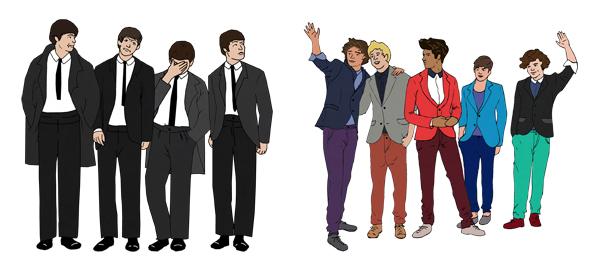British influence: Bands like The Beatles invaded our shores in the 1960s during the British Invasion. Today, One Direction is gaining popularity in the U.S.
What do Paul Revere and hormonal teenage girls from the 1960s have in common? They both led the warning call for the incoming British (granted the former did so during the Revolutionary War, while the latter were screeching for what we have all come to know as the the Fab Four). In celebration of the 50th anniversary of the original British Invasion, let’s look at what appears to be the second coming of these tea-drinking, football loving, Absolutely Fabulous (look it up) British fiends.
The First Wave
I’m not talking about the War of Independence, I’m referring to the wave of British bands that invaded our soil in the early 1960s.
Bands that included The Beatles, The Rolling Stones and The Who, those bands that ruined the purity of the American youth and forever changed the music industry.
“When we call it the British Invasion, it’s interesting because we were the creators of it as well,” Palo Alto High School sociology teacher Benjamin Bolanos says. “We actually influenced them and they’re giving something back, so they take something that we created and change and give it back to us.”
Anglophilimania
Its been 50 years since the first wave of British stormed our shores, but it seems that the American love affair with our European brethren just won’t go away.
Maybe it’s the royal family, which has received a lot of attention, or maybe there’s a deeper connection between our two nations than a dashing ginger prince who can’t seem to remember to put his trousers on.
“It’s easy to transfer different types of values, musically and through the media, because we have common history,” Bolanos says. “When you talk about American history it’s hard not to talk about British history.”
The Revival of the Boy Band
It’s been a long time since a British boy band reached such great heights in the minds of American teenage girls. We all know about the group that has managed to squeeze its way onto the American music radar: One Direction, the only reason I get up in the morning. (How else would I know that I’m beautiful?)
The growing popularity of One Direction seems to have proliferated in the past couple months. Recently, they graced the cover of Seventeen magazine, a privilege usually reserved only for females.
One Direction’s single, “Live While We’re Young” debuted at No. 3 on the Billboard Hot 100 songs chart, but they’re not the only British band that has found celebrity in the U.S. Yet another British boyband, The Wanted, peaked at No. 3 on the Hot 100 with their single “Glad You Came.”
Take Over of the Airwaves
It’s not just British pop that has gained traction in the U.S., but bands including the Arctic Monkeys and Mumford and Sons have also been able to gain stardom across the pond.
The Arctic Monkeys’ fourth album Suck It and See reached No. 14 on the Billboard 200 in June 2011 and Mumford and Sons second album released earlier this year Babel peaked at No. 1 on the Billboard 200.
Female artists, most notably Adele, have also broken through the American market. One of the most recognizable and popular British artists to arrive in the past years, Adele has gained widespread fame throughout the globe. Her second album 21 produced hit singles such as “Rolling in the Deep” and “Rumour Has It.” The record also earned her a Grammy for album of the year in 2012.
Another emerging female artist from the U.K., Ellie Goulding, recently released her second album after her debut reached No. 142 on the Billboard 200. After appearing on SNL in May 2011, her debut album “Lights” re-entered Billboard 200 and reached No. 76.
Doctor Who?
It’s not just music that has invaded our soil, but one peculiar doctor has also found a stronghold. “Doctor Who” chronicles the adventures of the Doctor, a time lord, who has the ability to travel through space and time. The program first aired in the 1960s, but was revived in 2005.
“Doctor Who” has become a growing phenomenon in the U.S. along with other BBC programs like “Sherlock” and ITV’s “Downton Abbey.” These shows often provide abstract plot lines and relief from the average American sitcom or game show.
“We share similar interests in what type of shows we watch,” Bolanos says. “Also part of the reason that British television has become more popular, I feel, is that British shows are much more sophisticated, there’s more depth to it compared to some American shows.”

As for the Doctor, he seems to be enjoying his increasing success stateside. According to the Telegraph, the premiere of the seventh season in the U.S. drew around 1.56 million viewers, smashing previous records ratings for the show.
“American television usually consists of reality TV, but with ‘Doctor Who’ there is a huge demographic from young generations to older ones, and on top of that, it’s been going on since the 60s,” says “Doctor Who” fan and Palo Alto High School junior Abigail Schmidt. “It has a plot so it’s not just reality TV, but intellectual as well.”
British television managers seem to be acutely aware of their skyrocketing success with the American populace. “Doctor Who” is followed by “Copper,” a show that airs only on BBC America and specifically targets viewers in the States.
“The one-two punch of our returning hit series “Doctor Who” and our first original drama “Copper” combined to set a new weekend ratings record and deliver our most watched telecasts in our history,” Perry Simon, General Manager of Channels at BBC Worldwide America, says in an interview with BBC America. “Taken together with our most-ever Emmy nominations and our increased distribution, it feels like BBC America is clearly a network on the move

